Striving to become a university that contributes to core human resources development and the generation of vitality in the local community
Based on its fundamental principles of "student-centered education" and "researchand local contribution efforts that vitalize the region", Iwate Prefectural University aims to educate human resources key to local businesses and contribute to the vitalization of the local community.( 2nd term mid-term objective)
Student-centered education
Since our aim is to be "a university that increases student motivation", our programs include a solid education in liberal arts, meant to foster the students' understanding of human nature, as well as specialized education that stimulates active learning. Moreover, by providing volunteering opportunities and programs for the development of work skills, we place an emphasis on nurturing vigorous, independent individuals who can identify and solve problems.
- 〈Students' Community Service 1 〉
Iwate GINGA-NET Project - The goal is to create a system that will bring together students and the people in the earthquake-stricken areas.
Although there was a lack of young volunteers in Iwate Prefecture immediately after the earthquake and tsunami of 2011, students found themselves unable to volunteer due to difficulties in securing transportation, accommodation, and food.As a result, our students set up the IPU Student Volunteer Center, and, with the cooperation of NPOs and other organizations, created the Iwate GINGA-NET Project. This project, on a scale never seen before, enabled students from all over Japan to volunteer in the areas affected by the disaster.
The Iwate GINGA-NET Project started and prepared for action from March 27 to May 8, 2011, and then ran the Summer Galaxy Program for 7 weeks in August and September of 2011, the Winter Galaxy Program from December 28, 2011 to January 4, 2012, and then the Spring Galaxy Program from March 12 to March 26, 2012.
To carry on such successful activities and programs, Iwate GINGA-NET, a special non-profit corporation consisting of interested students, was launched in February 2012, to serve communities in the quake-stricken areas. |
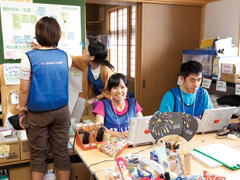 |
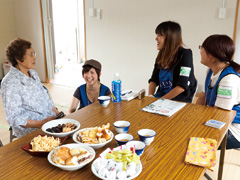 |
- 〈Students' Community Service 2 〉
FUKKO GIRLS* "Reconstruction Girls" - To energize the quake-stricken areas by supporting "Job Re-creation".
This is a group started by 9 students in the Faculty of Policy studies who wanted to help disaster victims regain jobs so that they would be able to support themselves.
The group believed that if local businesses had more opportunities to promote their products outside Iwate they would hire more people. They held sales events of products from the quake-affected areas of Iwate at locations such as the Iwate Ginga Plaza in Tokyo. The cause has gained wide attention through media outlets such as television and newspapers.
Because of the necessity for long-term support in the quake-stricken areas, the group is recruiting and accepting new members and continuing its activities. |
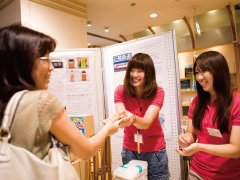 |
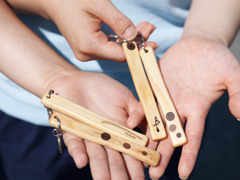 |
Research and local contribution efforts to vitalize the region
As a" hub of knowledge," Iwate Prefectural University is performing various activities in order to vitalize the local community, such as creating new assets through industry-university-government collaborations, strengthening its function as a think-tank for local issues, and providing learning opportunities to the citizens of the prefecture.
Furthermore, as part of its efforts towards reconstruction after the Great East Japan Earthquake and Tsunami, the university has been engaged in support activities and reconstruction research which fully utilize its intellectual resources and academic specialties; through such efforts, the university strives to gain the confidence of the local community to an even higher degree.
- 〈IPU's Community Service Example 1 〉
- Regional society is being invigorated through research activities that go beyond their narrow domain.
In April 2011, the Iwate Monozukuri and Software Integration Technology Center (i-MOS) and the Regional Policy Research Center were set up in the Regional Cooperation Building.
i-Mos integrates the university's software research and the software and manufacturing technology which Iwate Prefecture is proud to have already with the aim of creating new, innovative industries and a base for the gathering of industries. With research centering on next-generation intelligence information technology as a driving force, we are also striving to fulfil our responsibility as a liaison for securing research funds and coordinating the university and industries in various ways, through such activities as the training of specialists in high technology for manufacturing and support for prototype development.
The Regional Policy Research Center functions as a think tank responsible for dealing with regional matters involving the citizens of Iwate prefecture, as well as for reinforcing the bonds between the industries, various organizations, and the administration. We are making efforts to use the results of our research to serve the local community by providing advice based on empirical research, deploying lecturers, and holding symposiums. |
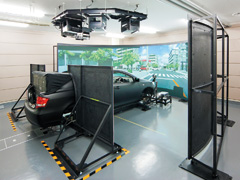
  |
| |
- 〈IPU's Community Service Example 2 〉
- The university's intellectual assets and human resources are used to support post-disaster recovery efforts.
IPU opened up its facilities immediately after the Great East Japan Earthquake and Tsunami of March 11, 2011, providing accommodation for students and collecting information. In addition, President Nakamura visited the 11 municipalities along the tsunami-stricken coast and explained the university's support system. Since then, the various strengths of our teaching staff have been put to full use to answer the calls for support from the disaster-affected areas.
On April 5, 2011 a Disaster Recovery Support Center was established as a general center for inquiries concerning volunteer activities involving students and teachers and the deployment of teaching staff. Furthermore, the Disaster Reconstruction Support Center has been established within the Regional Policies Research Center, and research has begun on 15 topics in the three fields of living, industry and economy, and society/lifestyle infrastructures.
We will continue to use our intellectual assets and human resources to reach out to the local communities and citizens and offer them our unwavering support. |
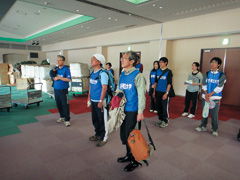
  |
| |













